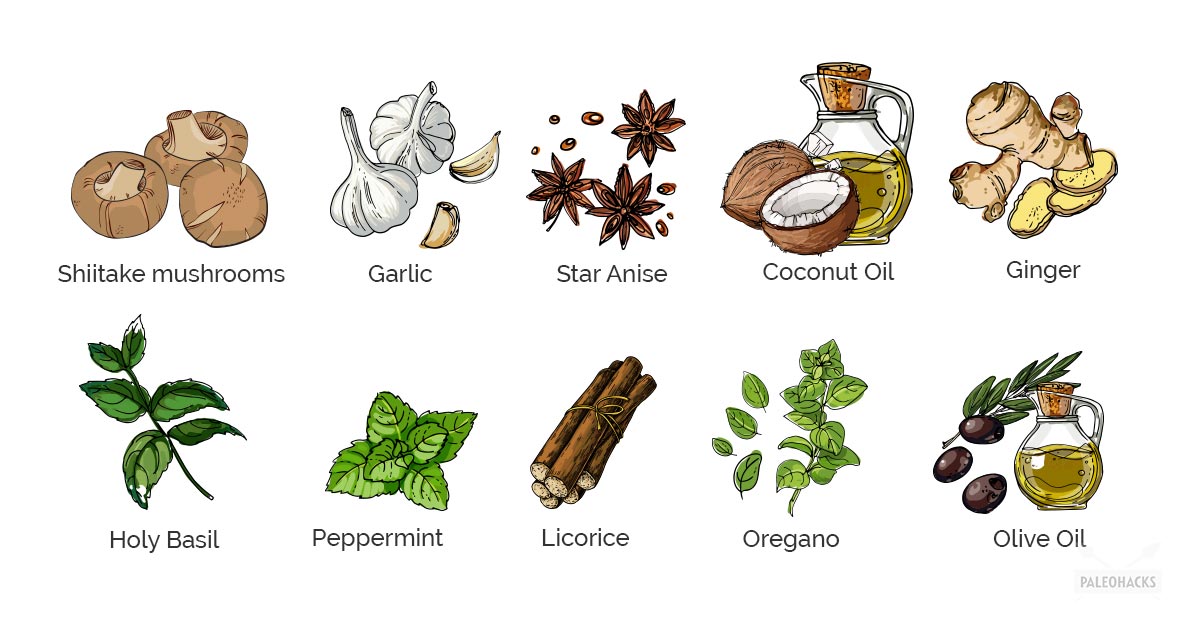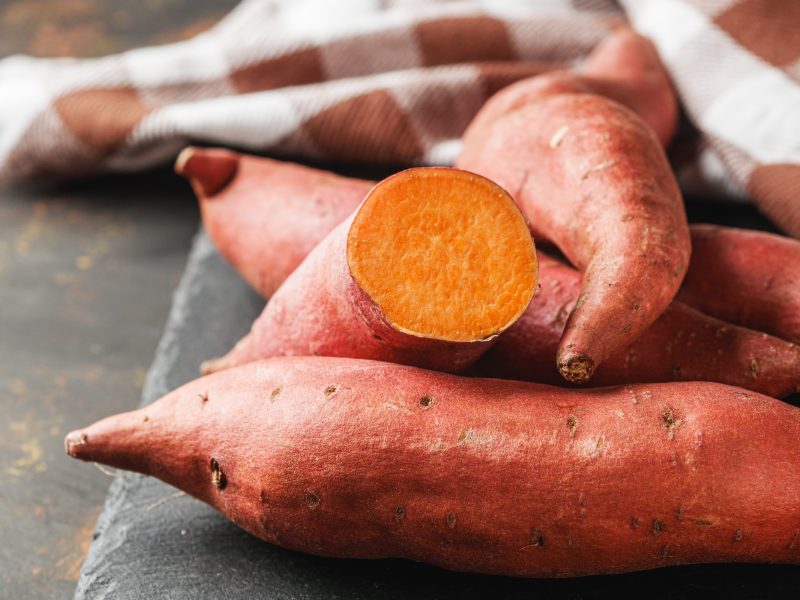Did you know that you probably already have a few powerful antiviral foods in your kitchen? Find out more about the top foods to help you fight off viral infections all year round.
There are over 219 virus strains that are capable of infecting humans, with more being discovered each year. In fact, researchers claim that over two-thirds of new human pathogens are viruses, rather than bacteria or other fungi. (1)
These numbers can seem startling. And, considering the recurring seasonal influenza and cold viruses, to newer outbreaks of strains like H1N1 (Swine Flu) and SARS-CoV-2 (COVID-19), it’s easy to feel uneasy come “flu” season.
Coconut Oil has hundreds of health benefits – learn how you can experience them with our FREE guide to Coconut Oil & its benefits.
Click here to subscribe
Fortunately, not only are our bodies equipped with a robust immune system to fight off viruses (when nurtured properly), but nature has also given us potent tools in the form of antiviral foods and herbs that help stop them in their tracks.
To find out how to nurture your immune system, read: How To Naturally Boost Your Immune System
Top 10 Antiviral Foods
Let’s take a look at the top 10 antiviral foods to stock up on not only during cold and flu season but year-round to help your body naturally fight viruses.
We’ve also included a few recipes at the end of the article to help you add these foods into your daily diet.
1. Shiitake Mushrooms
Shiitake has many antiviral tricks up its delicious cap. Studies show it not only helps regulate your immune system, which helps your natural pathogen-killing immune cells work more efficiently, but it also contains compounds that help inhibit viruses – even difficult-to-treat viruses like HIV. (2)
In particular, a compound referred to as LEM is shown in studies to inhibit HIV infections of human T cells (immune cells). (3)
Shiitake mushrooms are easy to add to stir-fries or even to a hearty soup or broth.
2. Garlic
Garlic is another culinary favorite that contains strong antiviral properties. Studies show that garlic extract and its compounds diallyl trisulfide, allicin, and ajoene, are active against the common cold, Influenza A and B, Herpes Simplex, viral pneumonia, and rotavirus.
One particular study involved 146 participants over 12 weeks. Half took a daily garlic supplement and the other a placebo. The placebo group had 65 cases of the common cold, whereas those who took garlic, only had 24. Overall, those who took garlic had fewer days of illness compared to the placebo group. (4)
You can infuse sautéed garlic into all kinds of dishes, ranging from soups and stews to casseroles and snacks.
3. Star Anise
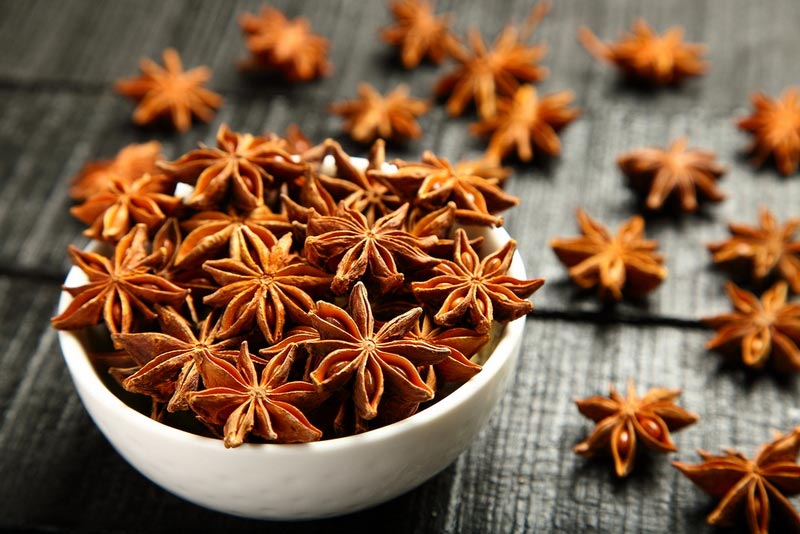
Star anise is a spice made from the fruit of the Chinese evergreen tree and is aptly named after its star-like shape. It contains many health-promoting compounds, but one in particular called shikimic acid is so effective as an antiviral that it is one of the main active ingredients in Tamiflu, a popular medication for influenza. (5)
Star anise works well with white meats like chicken, and also makes a great ingredient in marinades and stews. Add it liberally.
4. Coconut Oil
If you’re starting to feel as though there’s nothing coconut oil cannot do – you have a point. Coconut oil contains both monolaurin and lauric acid, which have demonstrated in studies to be able to disintegrate the outer membrane of pathogens, while also interfering with their ability to assemble and multiply inside your body. (6)
Most of us know the possibilities of coconut oil in cooking. You can use it in place of any oil, and also in things like baked goods and sweet treats.
5. Ginger
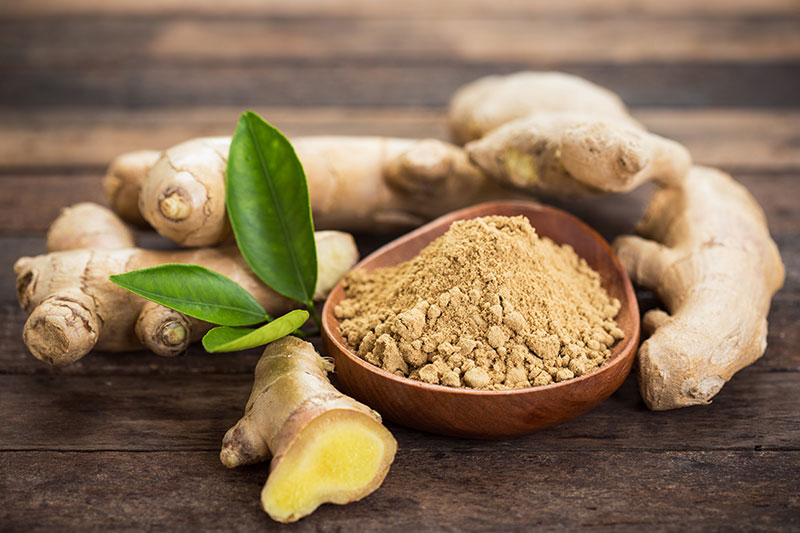
While ginger is commonly used medicinally for digestion, it also contains powerful antiviral properties. Studies show that it has the ability to increase antioxidant enzymes like superoxide dismutase and glutathione, which can help ease the inflammatory reactions caused by viral infections. In addition, specific anti-influenza compounds have been found to be present in ginger, so this may be one of your go-tos during flu season. (7)
Ginger can be cooked with as a spice, dried or fresh, or can be taken as a tea or in capsule form.
6. Holy Basil
Holy basil, sometimes known as Tulsi, is a herb indigenous to India that has been nicknamed the “Elixir of Life” due to its many therapeutic properties. Modern studies show its antimicrobial properties could make it effective as a hand sanitizer, mouthwash, and water purifier. In addition, it also works with your body to help fight viral infections by enhancing the immune response to invaders. (8)
Holy basil can be taken as a tea or a supplement.
7. Peppermint
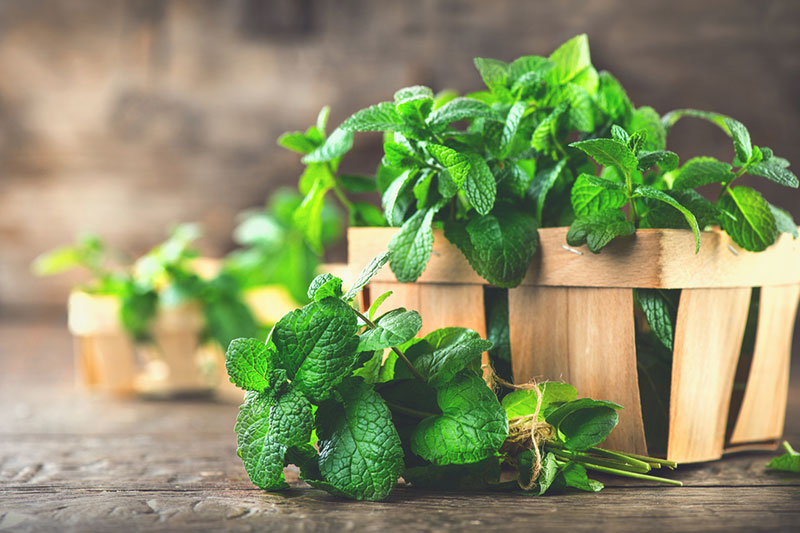
Peppermint is another herb commonly known for improving digestion, but in actuality, it also contains many antiviral compounds. Two of these, menthol and rosmarinic acid, are found in its leaves and essential oil.
One study found that peppermint extract displayed potent antiviral activity against the respiratory syncytial virus (RSV), while also helping to reduce inflammation. (9)
Peppermint can be taken as a tea, in capsule form, or you can even inhale the essential oil by using a diffuser.
8. Licorice
The thought of licorice may bring to mind the red strings of candy, but it turns out licorice root has been used for thousands of years in ancient medicine systems. It contains many antiviral substances, including but not limited to glycyrrhizin, liquiritigenin, and glabridin. Studies show licorice can help combat severe acute respiratory syndrome-related coronavirus (SARS-CoV), HIV, herpes viruses, and RSV. (10, 11)
Licorice is traditionally taken as a tea. Feel free to combine it with other teas or a dash of lemon if you don’t particularly care for the taste. You can also take it as a supplement.
9. Oregano
Oregano does much more than flavor delicious Mediterranean dishes. Studies show that within 15 minutes, both oregano oil and its isolated compound, carvacrol, can decrease the activity of MNV (murine norovirus). It also showed antiviral activity against herpes simplex virus type-1 and respiratory syncytial virus (RSV). (12, 13, 14)
Liberally add oregano as a spice to dishes (it’s delicious on chicken and seafood dishes) as well as try out oregano oil from your local health food store or online if you feel a cold coming on.
10. Olive Oil
Research claims one of olive oil’s main compounds, oleuropein, has potent antiviral activities. Researchers believe that this is because of its ability to interfere with the virus replicating and infection in the cells. Oleuropein was found to be effective against: hepatitis virus, rotavirus, herpes mononucleosis, canine parvovirus, bovine rhinovirus, and feline leukemia virus. (15)
Olive oil is excellent for roasting veggies and drizzled on salads, as well as for sautéing.
Antiviral Recipes
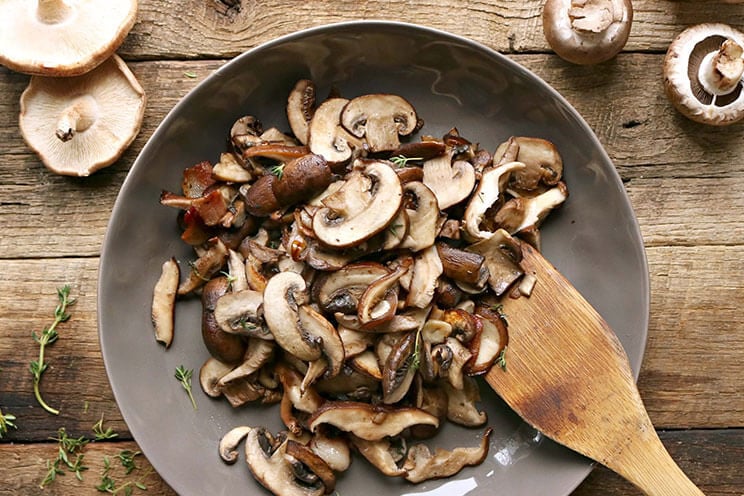
Below are three recipes using a few of the antiviral foods above. Feel free to experiment with your own recipes and favorite dishes.
Sautéed Bacon, Mushrooms, and Herbs Recipe
This recipe contains shiitake mushrooms and garlic, so it’s packed with antiviral goodness. You can add a dollop of olive oil or extra garlic to boost its health benefits even more. It’s also keto and Paleo-friendly!
Raw Cacao Fat Bombs
These keto-friendly fat bombs are made with coconut oil and raw cacao. They are a great way to increase your intake of coconut oil and all its antiviral properties. Apart from being delicious, cacao also has many health benefits which can only help boost your immune system.
Maple and Ginger Tonic
If you feel like you are coming down with something, make this warming ginger tonic infused with maple and cinnamon. If you aren’t a strict vegan, you can swap the maple syrup for raw honey that’s also healthy and good for your immune system.
The Bottom Line
Nature provides a wealth of foods and herbs that help naturally fight viruses, giving our natural immunity a microbe-fighting sidekick that lowers our risk of becoming infected. Add more of these top 10 virus-fighting foods to your daily diet throughout the year to give your body a fighting chance.
Read This Next: 10 Antiviral Herbs to Naturally Fight Infection and How to Use Them
